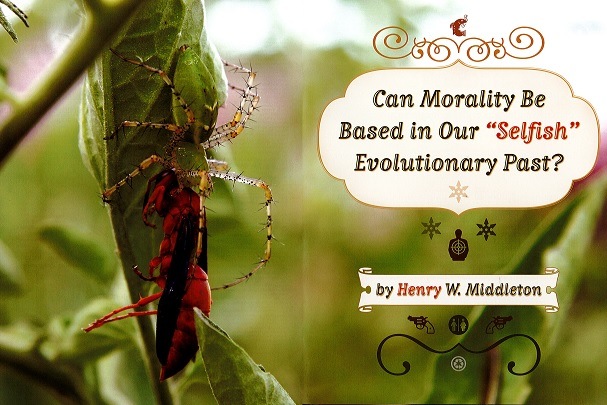This article first appeared in the Christian Research Journal, volume 32, number 05 (2009). For further information or to subscribe to the Christian Research Journal go to: http://www.equip.org/christian-research-journal/
SYNOPSIS
Richard Dawkins argues that genes act “selfishly” in order to increase their chances of survival, or being passed on to the next generation. In order to achieve this goal, he says that they predispose their host organisms to act altruistically for selfish gain.
Dawkins argues in The God Delusion that such behavior provides an evolutionary explanation for the existence of morality independent of God or religion. However, his argument has the following problems. First, he does not explain how natural selection can produce moral obligation. Evolution might explain what people do but not what they should do. In River out of Eden, Dawkins even admits that nature, in an evolutionary model, is indifferent to kindness and cruelty. Objective and universal morals require a transcendent standard that purely naturalistic evolution cannot provide. Second, Dawkins does not distinguish between the role of God and the role of religion in providing a basis for morality. God’s revelation though their inner moral conscience is discernable to people regardless of their religious beliefs or lack thereof.
In the end, Dawkins’s evolutionary model does not provide a firm basis for objective and universal expression of the holy, just, and loving nature of the eternal God who created the universe and has revealed Himself to mankind.
Christians argue that the existence of universal and objective morality is evidence for the existence of God. C. S. Lewis provides a classic example of this argument in Mere Christianity.1 In The God Delusion, however, Richard Dawkins of Oxford University claims that morality is grounded in evolution and that a person can be moral without God or religion.
Dawkins acknowledges that on the surface Darwinism seems to be inadequate to explain goodness and morality. After all, what is the survival value of such sentiments? He nonetheless attempts to explain morality through his “selfish gene” theory by which genes ensure their own survival by encouraging altruistic behavior, such as through reciprocal altruism or aiding one’s genetic kin.2
Dawkins also argues that if our morality is grounded in our “Darwinian past” then we can expect to find universal morals that transcend cultural and religious boundaries. He cites studies that allegedly demonstrate that religious people do not differ from atheists in their morals.3 He concludes that “we do not need God in order to be good—or evil.”4
Considering his atheistic assumptions, it makes sense that Dawkins would attempt to base morality on evolution. However, his argument does not do justice to the true nature of morality: (1) he does not adequately explain how natural selection can produce moral obligation; (2) he confuses the relationship between morality and either God or religion; and (3) he does not adequately explain why being moral is important.
PROBLEM ONE:
BRIDGING THE GAP BETWEEN WHAT IS AND WHAT SHOULD BE
Dawkins’s theory addresses whether actions either promote or hinder the survival of genes. This is merely a pragmatic criterion, but morality deals with concepts of right and wrong, not useful and not useful. No one consistently lives as if morals are merely based on survival value. People do regard some actions as genuinely right or wrong. Dawkins does not explain how the survival value of an action translates into the moral status of that action. As Dawkins admits elsewhere, “science has no methods for deciding what is ethical. That is a matter for individuals and for society.”5
Dawkins theorizes in terms of pragmatic survival value, but he misses this problem when he criticizes religion in terms of actual right and wrong:
The God of the Old Testament is arguably the most unpleasant character in all fiction: jealous and proud of it; a petty, unjust, unforgiving control-freak; a vindictive, bloodthirsty ethnic cleanser; a misogynistic, homophobic, racist, infanticidal, genocidal, filicidal, pestilential, megalomaniacal, sadomasochistic, capriciously malevolent bully.6
These considerations fill me with despair. They seem to show the immense power of religion, and especially the religious upbringing of children, to divide people and foster historic enmities and hereditary vendettas.7
Joshua’s action was a deed of barbaric genocide.8
A More Pessimistic Perspective
Dawkins demonstrates a very different attitude in River out of Eden: A Darwinian View of Life (published eleven years before The God Delusion). He explains how a female digger wasp lays eggs inside a caterpillar so that her larvae can eat it. She paralyzes the caterpillar but does not kill it so that the body remains fresh. Dawkins speculates that if the wasp’s venom included an anesthetic, then the caterpillar would not suffer while being eaten, but “nature is not cruel, only piteously indifferent. This is one of the hardest lessons for humans to learn. We cannot admit that things might be neither good nor evil, neither cruel nor kind, but simply callous—indifferent to all suffering, lacking all purpose.”9
In The God Delusion, Dawkins advocates seeking the greatest good for the greatest number of people,10 but in River out of Eden he explains that natural selection does not promote such behavior. He draws from the economic concept of utility functions (in other words, whatever a given system maximizes) and explains that natural selection maximizes the survival of DNA. He then proposes the concept of “God’s Utility Function.” He says that we can imagine that creatures were created by a Divine Engineer and then we can reverse engineer what he was trying to maximize.11 He applies this to what he considers to be the instability of cooperative effort:
Humans have a rather endearing tendency to assume that welfare means group welfare, that “good” means the good of society, the future well-being of the species or even of the ecosystem. God’s Utility Function, as derived from a contemplation of the nuts and bolts of natural selection, turns out to be sadly at odds with such a utopian vision. To be sure, there are occasions when genes may maximize their selfish welfare at their level, by programming unselfish cooperation, or even self-sacrifice, by the organism at its level. But group welfare is always a fortuitous consequence, not a primary drive. This is the meaning of the “selfish gene.”12
Dawkins returns to his example of the wasp and caterpillar and says that “Nature is neither kind nor unkind. She is neither against suffering nor for it. Nature is not interested one way or the other in suffering, unless it affects the survival of DNA.”13 He describes the crash of a school bus and quotes a writer who argues that the horror of such tragedies confirms that we live in a world of values, because if the world were just electrons, then there would be no problem of evil. Dawkins responds:
On the contrary, if the universe were just electrons and selfish genes, meaningless tragedies like the crashing of this bus are exactly what we should expect, along with equally meaningless good fortune. Such a universe would be neither evil nor good in intention. It would manifest no intentions of any kind. In a universe of blind physical forces and genetic replication, some people are going to get hurt, other people are going to get lucky, and you won’t find any rhyme or reason in it, nor any justice. The universe we observe has precisely the properties we should expect if there is, at bottom, no design, no purpose, no evil and no good, nothing but blind, pitiless indifference. As that unhappy poet A. E. Housman put it:
For Nature, heartless, witless Nature
Will neither know nor care.DNA neither knows nor cares. DNA just is. And we dance to its music.14
How can natural selection be the basis of morality (The God Delusion) if it is completely unconcerned with kindness and suffering (River out of Eden)? Dawkins shows some intellectual honesty (considering his atheistic assumptions) regarding morality in River out of Eden, but he appears to abandon it in The God Delusion. The reason for this change is unclear.
Morals Need a Solid Foundation
Paul Copan argues that evolutionary naturalism can describe how people behave, but it cannot prescribe how people should behave.15 In order to say that an action is good or evil, one needs an objective and universal moral standard that transcends individual people and individual societies. It must also be personal in nature. Moral standards deal with right and wrong, what should and should not be done. That implies a choice that requires personality and consciousness. A transcendent moral standard would therefore need to be grounded in a conscious, personal, and transcendent reality. Christians find this in God—the only place where such a standard can be found.16
If God does not exist, then as Francis Schaeffer explains, ethics merely explain what is rather than what should be. There is then no objective difference between kindness and cruelty because there is no standard.17 The very terms “kind” and “cruel” would be meaningless. As Norman Geisler and Frank Turek argue, atheists rule out a transcendent Lawgiver in advance:18 This creates a problem: “While they may believe in an objective right and wrong, they have no way to justify such a belief (unless they admit a Moral Law Giver, at which point they cease to be atheists)” (emphasis in original).19
PROBLEM TWO:
CONFUSING GOD AND RELIGION
In some places in The God Delusion Dawkins argues that God does not need to exist in order for people to be moral, and in other places he argues that people do not need religion or belief in God in order to be moral. He appears to use these two conditions interchangeably:
As we shall see, the way people respond to these moral tests, and their inability to articulate their reasons, seems largely independent of their religious beliefs or lack of them.20
The main conclusion of Hauser and Singer’s study was that there is no statistically significant difference between atheists and religious believers in making these judgments. This seems compatible with the view, which I and many others hold, that we do not need God in order to be good—or evil.21
You have fatally undermined your claim that God is necessary for us to be good. I suspect quite a lot of religious people do think religion is what motivates them to be good.22
Whatever its cause, the manifest phenomenon of Zeitgeist progression is more than enough to undermine the claim that we need God in order to be good, or to decide what is good.23
The distinction between these two conditions is significant. As explained above, objective morality requires a transcendent foundation in God. This is true regardless of a person’s specific religious beliefs, or lack thereof, and despite differing cultural standards. In the Christian worldview (to which Dawkins responds more than to any other religious worldview), God created mankind, and He has revealed Himself not only through the written revelation in the Bible and the incarnation of Jesus, but also through nature and mankind’s moral conscience. For example, the apostle Paul explains in Romans 2:13–16 that the Gentiles who do not have the written law are nonetheless inwardly aware of God’s moral law.
If God exists and has given mankind a moral conscience, then people will be aware of His moral law, despite differing cultural and religious standards. Human morality has a divine foundation, not only for Christians, Jews, and Muslims, but also for atheists. As Paul Copan explains, atheists can discern an objective difference between right and wrong without reference to special revelation (such as written scripture), but they lack “a proper metaphysical context” for such an affirmation, a context that is provided in the biblical affirmation that God exists and has created mankind in His image.24 Someone may be aware of morals without religion but not without God.25
PROBLEM THREE:
WHY EVEN BOTHER BEING MORAL?
Most atheists are not guilty of the immoral deeds perpetrated by atheistic regimes, but beyond evolutionary pragmatism and public pressure, what prevents a person from being immoral if atheism is true? Dawkins admits that evolution does not produce such virtues as generosity and universal love,26 but he argues that we have evolved to the point where we can rebel against our DNA and teach such values.27 However, he does not indicate why we should rebel and move beyond our evolutionary heritage.
If nature does not care about suffering, then why not be cruel if it is beneficial for the individual person or society? History provides numerous examples of cruelty and oppression by perpetrators who saw personal or societal benefit in their actions (such as Hitler’s “Final Solution”). Alister McGrath notes that “one of the greatest ironies of the twentieth century is that many of the most deplorable acts of murder, intolerance, and repression of that century were carried out by those who thought that religion was murderous, intolerant, and repressive—and thus sought to remove it from the face of the planet as a humanitarian act.”28 Dawkins argues that humans have progressed morally since the times of Genghis Khan and Hitler and will continue to progress,29 but he needs a standard by which to judge between moral systems. C. S. Lewis explains:
The moment you say that one set of moral ideas can be better than another, you are, in fact, measuring them both by a standard, saying that one of them conforms to that standard more nearly than the other. But the standard that measures two things is something different from either. You are, in fact, comparing them both with some Real Morality, admitting that there is such a thing as a real Right, independent of what people think, and that some people’s ideas get nearer to that real Right than others.30
Dawkins does not provide a clear standard. He supports a utilitarian ethic by which one should seek the greatest good for the greatest number of people, but he does not explain how to judge which consequences are good and which are bad.31 Lewis argues that a moral standard exists beyond human convention: “It begins to look as if we shall have to admit that there is more than one kind of reality; that, in this particular case, there is something above and beyond the ordinary facts of men’s behavior, and yet quite definitely real—a real law, which none of us made, but which we find pressing on us.”32
Dawkins also does not have a rational basis for moral values if people are the products of impersonal, random, evolutionary processes. He attempts to argue that natural selection is the very opposite of a chance process.33 Granted, if natural selection determines which genes survive based on their survival value, then it does not operate according to pure chance, but there are two problems. First, chance mutations will determine whether or not a gene arises as a candidate at all, even if natural selection itself is not a chance process. Second, Dawkins appeals to chance to explain how the first hereditary molecule arose and why one universe is favorable to life while another is not. He argues that chance (he also calls it “luck”) in the origin of life is not a significant problem because it only needs to happen once, while natural selection is a continuing process.34 This may reduce the role of chance, but it does not escape the reality of chance and the problem that it creates for objective morality. Life is still the product of chance.
In Dawkins’s model, morals are byproducts of evolution, which means that they are mere conventions. Nothing is genuinely right or wrong. An action is merely pragmatic or not pragmatic, desirable or not desirable (but pragmatic or desirable for whom? Who decides?). People are merely accidents of evolution, and there is nothing wrong with a stronger (more “fit”) accident oppressing a weaker (less “fit”) accident in order to move ahead. In fact, that would be natural selection at work.35
THE REALITY OF MORALS
Every person is aware that there is a genuine difference between right and wrong. As Paul Copan explains, “an ethic rooted in nature appears to leave us with arbitrary morality. Theism, on the other hand, begins with value; so bridging the is-ought gulf is a nonissue” (emphasis in original).36 God did not arbitrarily declare a standard of right and wrong, and He did not discover that standard. Instead, the standard that He has revealed is an expression of His eternally holy, just, and loving nature. Greg Bahnsen states that “as Christians we have an absolute, unchanging, holy God who has revealed an absolute, unchanging, holy law to provide an absolute, unchanging, holy foundation for our ethical outlook and our moral conduct.”37
Christians have an absolute, unshakable, and unchanging standard of morality. The atheist does not have such a basis. Gary Habermas argues:
One may have a strong, personal disgust for eating eggplant, but such an act is far from being immoral. Similarly, what we commonly view as evil in the world on an atheistic ethical system amounts to personal distaste, not to an objective problem for theism. Atheists have lost their favorite argument against theism.
To summarize briefly, we cannot have it both ways: we can accept absolute morality and face the strong possibility of the theistic universe, or we can deny it and acknowledge that we cannot lay evil at God’s feet, for there would be no such thing as objectively recognized wickedness. Either way, atheism receives a serious blow.38
It is true that some people have committed atrocities in the name of Christ, but they acted contrary to the teachings of Christ. This illustrates the depravity inherent in the heart of every person and the need for Christians to continually strive to serve Christ more fully. Atheism does not account for mankind’s fallen nature,39 and it does not provide an adequate basis for morality or for the concepts of good and evil. As Joel McDurmon notes, “The atheist has no Golden Rule because he has no Golden Ruler.”40 When morality is divorced from its foundation in God, mankind ultimately has no stable foundation on which to judge the good and the bad. The Christian does have such a standard.
Henry W. Middleton, Ph.D., is a researcher and advisor for TrueLife.org. He also writes a Christian apologetics blog at http://thoughtsonapologetics.blogspot.com.
Notes
- See C. S. Lewis, Mere Christianity (New York: MacMillan Books, 1952), 17–39.
- See Richard Dawkins, The God Delusion (Boston: Houghton Mifflin, 2006), 214–20. Dawkins says in a radio interview that altruism towards individuals who cannot reciprocate is a “mistaken byproduct” but a mistake of which he approves. Terry Gross, Fresh Air (March 28, 2007), 50 min, MPEG-4, http://itunes.apple.com/WebObjects/MZStore.woa/wa/ viewAudiobook?id=251744842&s=143441.
- See Dawkins, The God Delusion, 222, 225.
- Ibid., 226.
- Richard Dawkins, A Devil’s Chaplain: Reflections on Hope, Lies, Science and Love (Boston: Houghton Mifflin, 2003), 34. See also Gregory Koukl, “Monkey Morality: Can Evolution Explain Ethics?” Christian Research Journal, April–June 1998, http://www.equip.org/articles/evolution-and-ethics.
- Dawkins, The God Delusion, 31. For a response to such charges, see Paul Copan, “Is Yahweh a Moral Monster? The New Atheists and Old Testament Ethics,” Philosophia Christi 10, 1 (2008): 7–37; also available from the Evangelical Philosophical Society, http://www.epsociety.org/library/articles.asp?pid=45.
- Dawkins, The God Delusion, 257.
- Ibid. Dawkins is referring to the attack on Jericho in Joshua 6.
- Richard Dawkins, River out of Eden: A Darwinian View of Life, The Science Masters Series (New York: Basic Books, 1995), 95–96.
- See Dawkins, The God Delusion, 232–33.
- See Dawkins, River out of Eden, 103–5.
- Ibid., 121–22. Also Richard Dawkins, The Selfish Gene, 30th anniversary ed. (Oxford: Oxford University Press, 2006), 2–4.
- Dawkins, River out of Eden, 131.
- Ibid., 132–33.
- See Paul Copan, “A Summary Critique: Why Science Can’t Explain Morality,” Christian Research Journal 29, 6 (2006): 44.
- Paul Copan makes a similar argument in “God, Naturalism, and the Foundations of Morality,” in The Future of Atheism: Alister McGrath and Daniel Dennett in Dialogue, ed. Robert B. Stewart (Minneapolis: Fortress Press, 2008), 147–48. Also available at PaulCopan.com, http://paulcopan.com/articles/pdf/God-naturalism-morality.pdf. See also J. M. Njoroge, “The New Atheism and Morality,” Ravi Zacharias International Ministries, at http://www.rzim.org/USA/USFV/tabid/436/ArticleID/10020/CBModuleId/881/Default.aspx.
- See Francis A. Schaeffer, He Is There and He Is Not Silent, in The Francis A. Schaeffer Trilogy: Three Essential Books in One Volume (Wheaton, IL.: Crossway Books, 1990), 291–301.
- See Norman L. Geisler and Frank Turek, I Don’t Have Enough Faith to Be an Atheist (Wheaton, IL.: Crossway Books, 2004), 191.
- Ibid., 193.
- Dawkins, The God Delusion, 223.
- Ibid., 226.
- Ibid., 227.
- Ibid., 272.
- See Copan, “Is Yahweh a Moral Monster?” 35–36. Also Copan, “God, Naturalism, and the Foundations of Morality,” 145–57.
- Dawkins’s appeal to studies regarding behavior among religious and nonreligious people does not prove that God is unnecessary in order for a person to be moral. At most such studies demonstrate that a moral distinction between right and wrong is universal among mankind, which is part of Paul’s argument in Romans 2:13–16.
- See Dawkins, The Selfish Gene, ix, 2–3.
- 27 See ibid., xiv, 3, 139, 200–201, 267–68.
- Alister McGrath, “Has Science Eliminated God? Richard Dawkins and the Meaning of Life,” Science and Christian Belief 17, 2 (October 2005): 132. For examples of actions committed under atheistic communism, consult Stéphane Courtois, Nicholas Werth, Jean-Luc Panné, et. al., The Black Book of Communism: Crimes, Terror, Repression (Cambridge, MA: Harvard University Press, 1999).
- See Dawkins, The God Delusion, 265–72.
- Lewis, Mere Christianity, 25.
- See Dawkins, The God Delusion, 232–33. See also Dawkins, River out of Eden, 104.
- Lewis, Mere Christianity, 30.
- See Dawkins, The God Delusion, 113–14.
- See ibid., 137–40, 158.
- Dawkins describes slavery among ants (The Selfish Gene, 177–79), but he opposes slavery among humans (The God Delusion, 169, 265, 271).
- Copan, “God, Naturalism, and the Foundations of Morality,” 152.
- Greg L. Bahnsen, Pushing the Antithesis: The Apologetic Methodology of Greg L. Bahnsen, ed. Gary Demar (Powder Springs, GA: American Vision, 2007), 182.
- Gary Habermas, “The Plight of the New Atheism: A Critique,” Journal of the Evangelical Theological Society 51, no. 4 (Dec. 2008): 823.
- See Ravi Zacharias, Can Man Live without God? (Nashville: Thomas Nelson, 1994), 189.
- Joel McDurmon, The Return of the Village Atheist (Powder Springs, GA: American Vision, 2007), 28.










